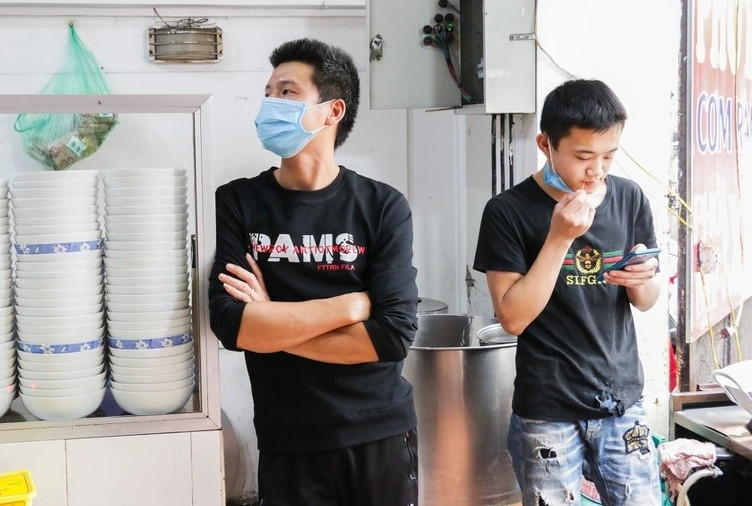Pressure to send money to parents
After 3 years of working, Thanh Nga (25 years old, District 3, Ho Chi Minh City) does not have a penny in savings. Her monthly salary ranges from 12 to 17 million VND depending on work performance. However, no matter how much she earns, she will quickly spend it all because her family in the countryside always needs money.
After receiving a monthly salary, she sent 4 million dong to her hometown to help her parents pay for her living expenses and take care of her sister’s college education.

On every occasion of grandparent’s death anniversary, holiday or other incident such as shopping for supplies, strengthening the roof against storms, repairing the garden, etc., she arranges and sends an additional 2-5 million dong.
During the Lunar New Year, Thanh Nga prepared about 20 million VND to give to her parents. If the company pays salary/bonus late, too close to Tet, she will borrow money from friends and send it home first so that her family can shop for the end of the year.
The rest of the money, she balances to just live in Ho Chi Minh City, although not rich, fortunately rarely needs to borrow money.
“Since working, I only have one trip to Da Lat, once to Vung Tau, still use old motorbikes and rarely buy clothes and cosmetics. I don’t mind sending money back to my hometown. , but admittedly, sometimes I feel pressured and pitiful when I see my friends live more carefree and comfortable lives than me,” she shared.
Pressure
Like Thanh Nga, Nguyen Thanh (27 years old, Phu Nhuan district, Ho Chi Minh City) was confused and embarrassed many times because his family constantly had problems and wanted him to send money.
In 2019, after 2 years of working, Thanh saved 100 million dong and sent it back to his hometown to ask for help from his mother. Half a year later, his mother said the money had run out as she used it to pay off debts, treat her diabetes and repair the dilapidated toilet.
For the first time in adulthood, he burst into tears in his motel room.
“I know what my mother does is right, the family’s debt is also due to me going to university, which my parents have to borrow. But I am very sad because my mother used all her sweat, tears, and money without even paying for it. I said an hour in advance. I was very proud and expected to use that money to open a small shop with you,” Thanh said.
Although disappointed, Thanh tried not to show his mood to his mother. He said he could earn his money back, but he just wanted to take care of it himself, not asking his mother to help him anymore.
But that does not mean that the situation is different. Mother repeatedly called Thanh to ask about salary, advised if you have money, send some money back to the family to cover debt, visit filial piety and joy.
After each such call, he sent back several million dong to help his mother relieve her economic worries. Many times, he even sent back a larger amount (about 20-30 million VND) and encouraged his parents to raise more livestock or plant industrial crops instead of just growing rice according to the season. However, the plans failed.
“My parents are old, don’t have a pension, and don’t have much health to do anything new like young people. I buy health insurance for my parents, paying more than 30 million dong a year. I don’t even buy one. Any life insurance for me”, Thanh expressed.

Thanh’s pressure was pushed to a climax during the prolonged period of social distancing in the middle of last year in Ho Chi Minh City.
Accordingly, his job requires face-to-face meetings with customers. During 5 months of “burying his feet” at home, he was only paid a solid salary of 6.8 million VND. He received more seasonal jobs to do online, however, the total income was just over 10 million VND, nearly half of what it was before the epidemic.
Meanwhile, his parents in the countryside still told him to send money back. Understanding that the epidemic is a common difficulty for all, the family in the countryside is even more struggling because there is no source of income, Thanh withdraws his savings from the bank to send home 6 million VND each month. This is the amount of money he thinks is just enough for his parents to live, eat and buy medicine to treat old age diseases.
“The epidemic has hit, I have to withdraw my savings to send back a little to my parents, also to make up for my living expenses for the months of not enough salary. I am under pressure because I have too many things to worry about. While Friends have settled down, many can buy houses or cars, I still have to withdraw money to do business to take care of my family,” Thanh said.

Is it a burden?
Filial piety and love used to be the norm in many families in Asia, such as Korea, China, and Japan.
Now, however, everything has changed.
According to a survey released in November 2021, about 70% of people over 60 in South Korea are still working for money and living separate lives from their children. Korea Bizwire news.
A survey conducted by Statistics Korea on 36,000 people showed that the majority of elderly people in Korea still have to do manual labor because they are not supported, most of them do not have a financial plan before retirement.
According to Korea ExposeThe concept of family has more or less changed. Most young people these days are more interested in their personal lives. They don’t want to make unconditional sacrifices for their family like previous generations.
Similarly, in November 2021, the Chinese government announced a policy to encourage young adults to live with their parents in an effort to cope with the worsening aging of the population. SCMP.
Official data from the country shows that more than 100 million people aged 60 and over in China are living alone or with only a partner.
Many of them are known as “old people left behind” in rural areas where social security systems are poor, as people of working age have moved to work in the rural areas. city.
According to The Straits TimesSuresh Rajenthiran, a marketing and communications director in Malaysia, once shared his views on the situation of children refusing to take care of their parents in this country: “At a certain stage in life, we all We may feel that our aging parents have become a burden, especially when we are trying to build our careers, goals or relationships, but what if you know what your parents hoped for. born for you, you will no longer consider it as a burden, but as your own duty.”

Nguyen Thanh’s view is similar. He said he was not angry with his parents, thanks to them he was able to study and have a job like today. He just wished he could earn more money to easily take care of his family without affecting other life plans.
“It is true that the responsibility to parents is not easy, even more difficult when I later get married. But I don’t want my parents to suffer anymore because their whole life is too hard,” Thanh said. .
Meanwhile, according to Thanh Nga, her pressure does not come from taking care of her parents but from the ineffective use of finances.
After going to work, because she was too eager to help her family, she spent most of her income to send it back to her hometown, forgetting about the need for entertainment, reinvesting in health and spirit. As a result, she fell into a bad mood because she ran out of money even though her family didn’t really ask for that much in return.
“My parents in the countryside don’t know how much my income is. I always say I’m fine every time I send money, but my heart is full of turmoil. I realize it’s all my fault. I’m learning how to balance for spending, accumulate more to rebalance,” Russia said.
“I think for parents, happiness is seeing their children happy. Becoming mature, happy and experienced is also a way to please parents,” she added.
According to Zing
at Blogtuan.info – Source: vietnamnet.vn – Read the original article here

